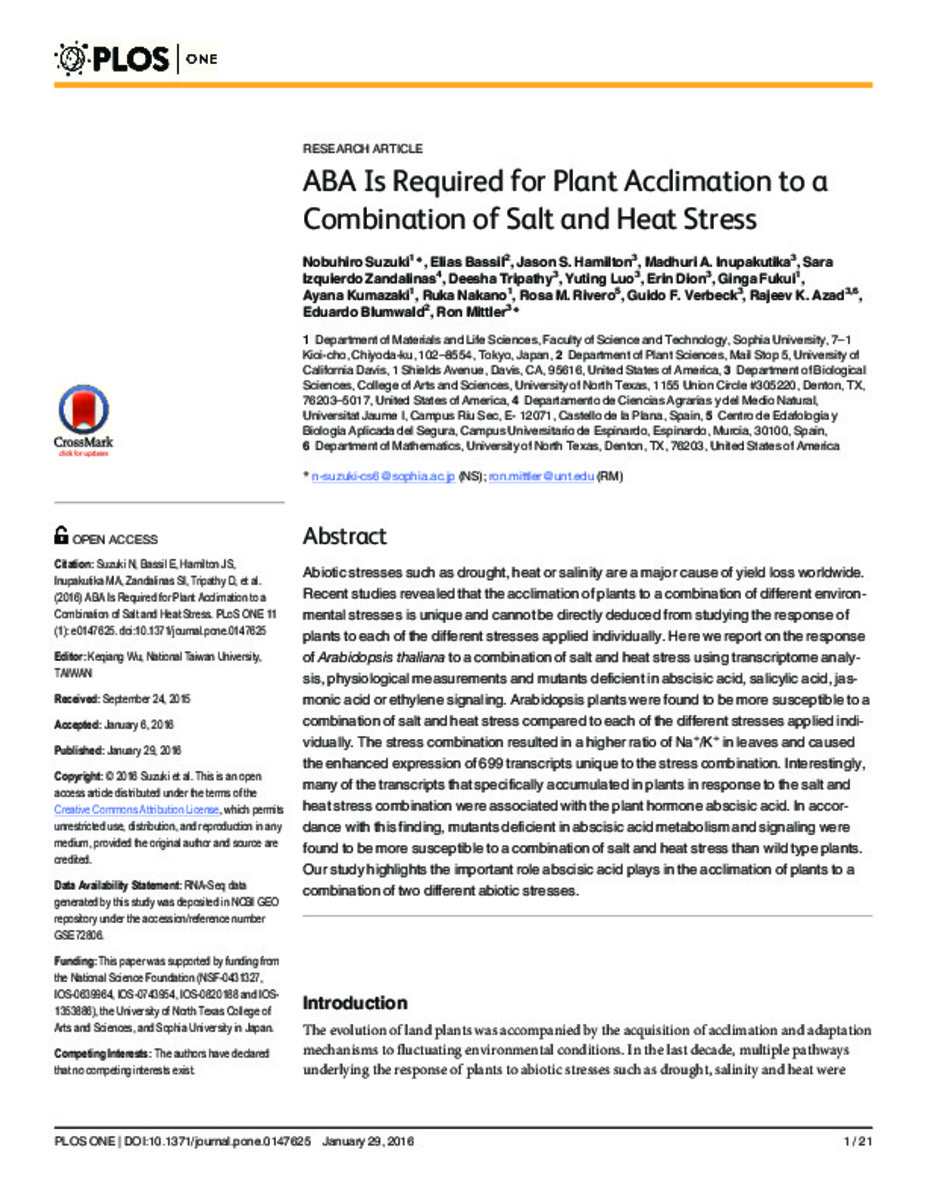Mostrar el registro sencillo del ítem
ABA Is Required for Plant Acclimation to a Combination of Salt and Heat Stress
| dc.contributor.author | Suzuki, Nobuhiro | |
| dc.contributor.author | Bassil, Elias | |
| dc.contributor.author | Hamilton, Jason S. | |
| dc.contributor.author | Inupakutika, Madhuri | |
| dc.contributor.author | I Zandalinas, Sara | |
| dc.contributor.author | Tripathy, Deesha | |
| dc.contributor.author | Luo, Yuting | |
| dc.contributor.author | Dion, Erin | |
| dc.contributor.author | Fukui, Ginga | |
| dc.contributor.author | Kumazaki, Ayana | |
| dc.contributor.author | Nakano, Ruka | |
| dc.contributor.author | Rivero, Rosa M | |
| dc.contributor.author | Verbeck, Guido F. | |
| dc.contributor.author | Azad, Rajeev K. | |
| dc.contributor.author | Blumwald, Eduardo | |
| dc.contributor.author | Mittler, Ron | |
| dc.date.accessioned | 2016-03-23T08:52:44Z | |
| dc.date.available | 2016-03-23T08:52:44Z | |
| dc.date.issued | 2016-01-29 | |
| dc.identifier.citation | SUZUKI, Nobuhiro, et al. ABA Is Required for Plant Acclimation to a Combination of Salt and Heat Stress. PloS one, 2016, vol. 11, no 1, p. e0147625. | ca_CA |
| dc.identifier.issn | 1932-6203 | |
| dc.identifier.uri | http://hdl.handle.net/10234/154986 | |
| dc.description.abstract | Abiotic stresses such as drought, heat or salinity are a major cause of yield loss worldwide. Recent studies revealed that the acclimation of plants to a combination of different environmental stresses is unique and cannot be directly deduced from studying the response of plants to each of the different stresses applied individually. Here we report on the response of Arabidopsis thaliana to a combination of salt and heat stress using transcriptome analysis, physiological measurements and mutants deficient in abscisic acid, salicylic acid, jasmonic acid or ethylene signaling. Arabidopsis plants were found to be more susceptible to a combination of salt and heat stress compared to each of the different stresses applied individually. The stress combination resulted in a higher ratio of Na+/K+ in leaves and caused the enhanced expression of 699 transcripts unique to the stress combination. Interestingly, many of the transcripts that specifically accumulated in plants in response to the salt and heat stress combination were associated with the plant hormone abscisic acid. In accordance with this finding, mutants deficient in abscisic acid metabolism and signaling were found to be more susceptible to a combination of salt and heat stress than wild type plants. Our study highlights the important role abscisic acid plays in the acclimation of plants to a combination of two different abiotic stresses. | ca_CA |
| dc.description.sponsorShip | This paper was supported by funding from the National Science Foundation (NSF-0431327, IOS-0639964, IOS-0743954, IOS-0820188 and IOS- 1353886), the University of North Texas College of Arts and Sciences, and Sophia University in Japan. | ca_CA |
| dc.format.extent | 21 p. | ca_CA |
| dc.format.mimetype | application/pdf | ca_CA |
| dc.language.iso | eng | ca_CA |
| dc.publisher | Public Library Science | ca_CA |
| dc.relation.isPartOf | PloS one, 2016, vol. 11, no 1 | ca_CA |
| dc.rights | © 2016 Suzuki et al. This is an open access article distributed under the terms of the Creative Commons Attribution License, which permits unrestricted use, distribution, and reproduction in any medium, provided the original author and source are credited. | ca_CA |
| dc.rights.uri | http://rightsstatements.org/vocab/InC/1.0/ | * |
| dc.subject | arabidopsis-thaliana | |
| dc.subject | gene-expression | |
| dc.subject | reactive oxygen | |
| dc.subject | abscisic-acid | |
| dc.subject | drought stress | |
| dc.subject | salicylic-acid | |
| dc.subject | abiotic stress | |
| dc.subject | high-salinity | |
| dc.subject | h+-atpase | |
| dc.subject | rna-seq | |
| dc.title | ABA Is Required for Plant Acclimation to a Combination of Salt and Heat Stress | ca_CA |
| dc.type | info:eu-repo/semantics/article | ca_CA |
| dc.identifier.doi | http://dx.doi.org/10.1371/journal.pone.0147625 | |
| dc.rights.accessRights | info:eu-repo/semantics/openAccess | ca_CA |
| dc.relation.publisherVersion | http://journals.plos.org/plosone/article?id=10.1371/journal.pone.0147625 | ca_CA |
Ficheros en el ítem
Este ítem aparece en la(s) siguiente(s) colección(ones)
-
CAMN_Articles [566]







